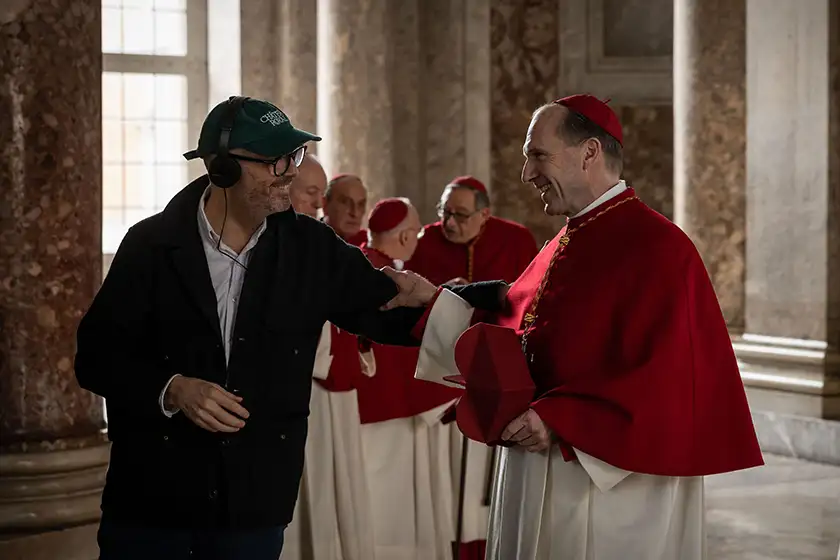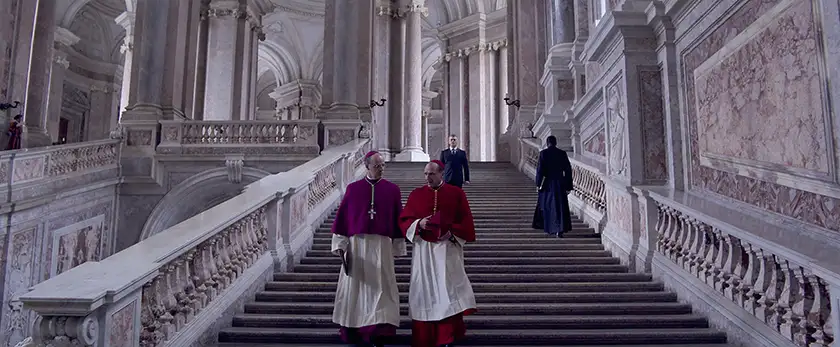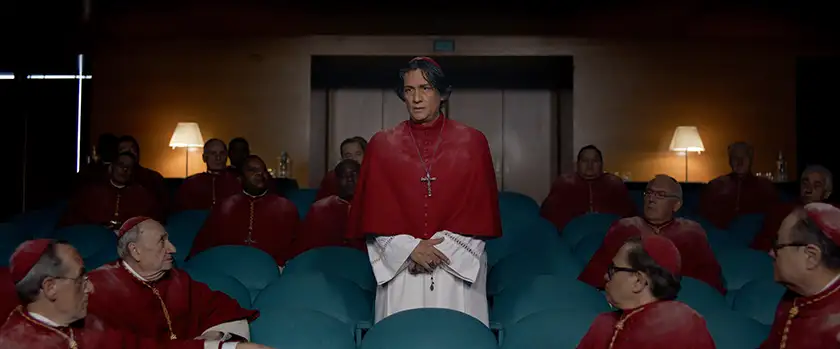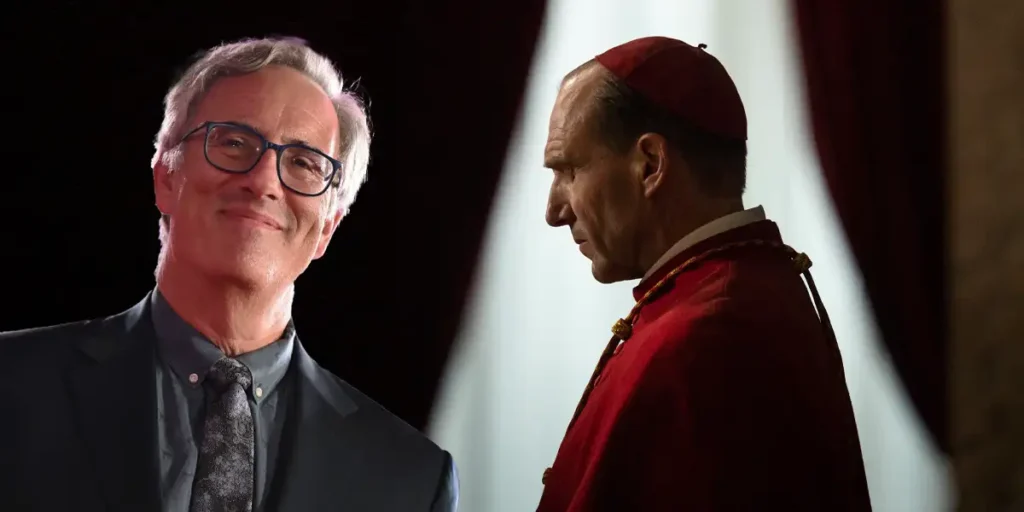We interview Conclave producer Michael Jackman to discuss how to choose good films, avoiding trouble with the Vatican, and how to forget politics and have fun.
Among the potential nominees of this year’s awards season, Conclave is possibly the most ambitious from a narrative point of view. It’s a thriller, a character study, and a metaphor all at once. Adapted from Robert Harris’ novel, it’s a gripping peek behind the curtain at the assembly of cardinals to elect a new Pope, it has to balance the logistics of the election process with the political deals being done behind closed doors, and the inner turmoil of the election’s overseer, Cardinal Lawrence (a magnificent Ralph Fiennes).
Producer Michael Jackman is no stranger to such challenging material. His credits include Denis Villeneuve’s Arrival, and The Good Nurse for director Tobias Lindholm. With an extensive decades-long background in production and postproduction, Jackman has overseen many notable films, and Conclave may become his most garlanded yet. We met Jackman in London ahead of Conclave’s gala screening at the London Film Festival, just its latest stop on a successful tour of many international film festivals. Read the interview below!
Michael Jackman on how a producer works
How and when did you get involved with Conclave?
Michael Jackman: I’ve been involved with Conclave for about two and a half years. [Co-producers] Tessa Ross and Juliette Howell are about six years into it. Tessa is the person who optioned the original book from Robert Harris and brought him on as another producer, and screenwriter Peter Straughn, director Edward Berger and me. I got involved when we were very close to greenlighting the movie. As a producer, my role on this particular film was liaising between the creative vision and the constraints of budget and schedule to achieve what Edward wanted to achieve. We wanted to make a fine movie that looks beautiful onscreen, and we wanted the time to shoot those things, and the time to edit it, and all the resources. It’s an interesting balance to look at that as a goal, but it’s not easy.
As a way of describing how a producer works on a film, can you explain how you went about your role on Conclave?
M.J.: I applaud you trying to explain to people what a producer is, because I don’t always know! A lot of producers, line producers, production managers, have the job of budget, period. It becomes a bit of a constant: “No, we can’t afford this. No, we can’t afford that.” That’s not what I do. I try to go, “Okay, what do we need? What do we want? What do we have? How do we achieve that?” It’s problem solving.

I like to use the metaphor of a wall. I have a lot of people walking along, and they need to get someplace. They come to a wall. Some people look at the wall and go, “Okay, it’s pretty high. Can’t go over it. Can’t dig under it. It’s too far around. It’s too far around the other way.” Then they turn around. I think the job is when you get to the wall, you do all those other things, and then you start to go, “Is this really a wall? Who said this is a wall? Maybe there’s no wall. Has anyone touched it? Can we walk right through it? Because a lot of times those things that seem like they’re blocking you from doing what you want to do. The friction, I think, between getting everything you want and having constraints makes for creative solutions and a better product, because you have to really think about what you want.
How would that process look on set?
M.J.: I want a win/win situation. Every time I want to be able to do what we need to do, and I want to be able to afford to do it, and have the time to do it. Within that we have to ask, “Do we really need to do this thing?” So the ability to talk creatively and be that liaison might make the difference.
Say, we have this room for the scene, and 300 extras. Filming starts, and then this guy comes in to chase someone about the budgeting and planning for this huge scene. It’s then I have a conversation with the director, to ask what we really need for this moment. If he says he just needs the moment in the corner when two people are having this conversation, and then they’re done. But people don’t always ask these questions, and that’s what I mean by solving the problem. You’ll never get everything.
I think my favorite quote is, ‘If you really want to screw over someone who’s creative, give them absolutely everything they want.’ It’s not a process of denial. It’s a process of pre-editing. If you’ve got everything, you’re going to throw a lot of things out and have too much to go through. The process of needing to really hone in on what you want creatively, I think, is beneficial.
Would you say that mindset comes from your experience in post-production?
M.J.: Absolutely. When I read a script or look at dailies, I’m always thinking about the finished movie. Every director is thinking about what they want to achieve. Since I’m not a director, and being a little less emotionally involved, I have a little more perspective sometimes, or a different perspective, asking if a given thing is going to even be in the movie. I think that’s an editorial experience. Not that I have more experience than directors, who spend huge amounts of time in editing, but I do come to it with that sense of where we’re going.
Post-production starts in pre-production. It’s valuable to understand where you want to be. For example, I did a film called The Good Nurse. There was a scene in that movie that we were trying to figure out how to do. It was a car chase. Jessica Chastain just finds out her best friend is a murderer, and she races home. She’s driving really fast. She’s stressed driving down the street. It’s at night, it has stunts and cars, it’s high speed.
We’re really struggling because that’s half a night shooting, and we’re trying to find somewhere to shoot. I started talking to Jessica, and we agreed it was really good on paper. But why is she racing home? She has no reason to think that this person is at her house. If she’s racing home and he’s there, there’s no surprise. If she just comes home and she’s happy to see the kids, she goes in expecting to see the babysitter, but there he is. That’s a ‘colour drains from your face’ moment. We cut the car chase, we didn’t shoot it, and it worked perfectly in that moment.
Michael Jackman on choosing his projects
What do you look for in a script or project?
Michael Jackman: My driving factor is people that I would like to work with. Filmmakers that I like, and that are interesting. I’ve been doing this a long time. It takes a lot of time to make a movie. I want to be working with people that are good people. I want to work on projects I like with people I love. I can’t hate the movie. I have to like the script, but they’re all very subjective. If I’ve got a filmmaker that I really like and respect, and I read a script that I think is pretty good, and they read and like the script, I’m in. I’m in because it’s going to change. It’s going to evolve.
I don’t know everything, and I like to follow the lead of a strong creative sensibility and help achieve that and elevate that however I can. There will be lots of creative conversations on ways to improve things. I don’t want to be a director. Being a producer is a holistic picture of achieving that vision that the director has, and contributing to it, but I need to like the person. That also means conflict, because in order to direct, you have to have a really strong opinion and belief that you are right in this approach. The people that I like can listen and collaborate.
People over projects is an interesting way to approach projects. It must come with complications.
M.J.: It’s not easy. It also means I don’t pursue just anything. I’m not out just looking for a job. I’m out there looking for people to work with. The thing I’m working on now is a project with the Ryder Picture Company. Aaron Ryder produced Arrival, and he’s a great producer and a dear friend. We worked together for many years. I’ve been looking for opportunities to work with him, and he’s got this project.
He and his partner, Andrew Swett, have a project I’ll executive produce called I Love Boosters with director Boots Riley. They reached out, asked me about it, and I was just looking for an excuse to say yes, because I love them. Boots is so interesting, and he’s a kind person. He’s got very strong opinions, and a crazy,interesting, smart, creative vision. It’s wild, but it’s, but it’s exactly what I’m hoping for. It’s great, so let’s go figure out how to do this!
Michael Jackman on the Vatican’s involvement in Conclave
Was the Vatican consulted at all in the production of Conclave?
Michael Jackman: From the beginning, we felt two things. Firstly, we did not want to show the film to the Vatican. We didn’t seek their blessing, so to speak! Secondly, even if you can shoot in the Vatican, they don’t tend to give rights for very long. We need all rights forever, so it really meant that there was no involvement from them. We just built the Sistine Chapel, as one does! That was the only sort of to-scale set that we made. The conclave votes in the Sistine Chapel, and we were very true to it in how we set it up. We built a full-size space, full dimensions, with a CG ceiling. You walked in there and you felt that you were in the room. It was great for the actors, and it was great for the whole thing. We were also inspired by very pedestrian spaces where, you know, people live and eat. The dining room that we used as the cardinals’ dining room was in a military base, and it was actually fancier than what they have.

There are only a couple of wide shots of St. Peter’s Basilica in the whole film. How do you get those without permission?
M.J.: You’re allowed to have the natural backgrounds. You can’t shoot Rome without seeing St. Peter’s anytime you’re in that area. We did use the skyline of Rome to connect the spaces that we shot, to give them that sense of being in Rome without actually shooting in Vatican City. There are a couple of shots that we filmed near St Peter’s, which was in the background, and then it’s just in the skyline. We found locations that had sort of that sense of opulence that we get at St Peter’s and in the square.
Michael Jackman on reactions to Conclave
How has the experience of bringing Conclave to festivals been?
Michael Jackman: It’s exciting, though it’s not as nerve wracking as our first screening [Conclave premiered at the Telluride Film Festival in August]. No one had seen it and there were no reviews, and it was like, “Okay, well, it’s two and a half years either down the drain, or continuing forward.” It was great, very exciting to get the reactions thus far.
Was there any apprehension about how Conclave might be interpreted in certain circles?
M.J.: Our anxiety was about whether people were gonna be surprised. Are they going to be invested in Lawrence and the other characters? Are the twists and turns good enough? Voting is not so exciting. Go up, pick the thing, put it in the thing. It was Edward’s sense of how he was going to put that together that was going to actually build tension. We wanted people to be excited, but there’s always anxiety about how people are gonna receive it. There are always gonna be people who are unhappy with anything that isn’t straightforward. There are gonna be people who are unhappy with you making any film that talks about the clergy or the church in any way that shows them other than pious people with the perfect intentions.
But we all know humans are humans. As we say in the film, they serve an ideal, but they cannot always be ideal, and that’s people, and that’s what we’re supposed to strive for.You know you’re not perfect, so you strive to be better, and everyone has different opinions about what’s better. We set up good people and bad people, and selfish people and magnanimous people, and liberals and conservatives, and those are the forces in any power struggle. Some people just want power for power’s sake, so that’s all in there. I can’t say we can take no position, because I think the book took a position, and the script takes a position. The movie has a perspective, but it’s not meant to hit anyone over the head.

What was the main aim with Conclave?
M.J.: Primarily, we want this movie to be fun. It’s a political thriller, and hopefully we get people on the edge of their seat. They’re following these characters up and down, twists and turns. They’re surprised. They’re enjoying it. They’re laughing at moments, and then we lead you to the surprise ending, and then we surprise you again, which I think is a lot of fun. I think some people would be ahead of us and figure out what’s going to happen at the end. I’d say half probably won’t be and so they’ll get a surprise. Then everyone relaxes, and then we curve again.
Our hope was that that’s how it would be received. It’s not a message movie. We’re not, you know, trying to say anything, although I think there is a general theme of acceptance and faith. For me, the most interesting story is Ralph Fiennes’ Cardinal Lawrence. It’s the journey of a man who’s questioning his faith, who then has to oversee the election of the Pope, God’s representation here on Earth. I thought his opening homily was an amazing take on faith and what it means, this idea of certainty being the enemy of faith. I love that, and I think it sets up the movie in terms of his journey.
In light of current events, wouldn’t you agree that people might be even more likely to read things into the film now?
M.J.: The novel was published in 2016. Different politics, but similar politics. It was published before Trump was President in the U.S., when we thought that wasn’t possible. I think there is a timelessness of the story of people pursuing power in any situation that, regardless of the politics today, you would connect it and feel that it’s relevant to the politics. I think it’ll be relevant to the politics 20 years from now, or 20 years ago. You could find those same things and think of it as a commentary on that, but it’s a commentary in any situation or time.
This interview was edited for length and clarity.
Conclave is now available to watch on digital and on demand. Read our article on the ending of Conclave explained and our review of Conclave!
Header Credits: Michael Jackman attends the Conclave Headline Gala during the 68th BFI London Film Festival at The Royal Festival Hall on October 10, 2024 in London, England (Jeff Spicer/Getty Images for BFI) / A still from Conclave (© 2024 Focus Features)

